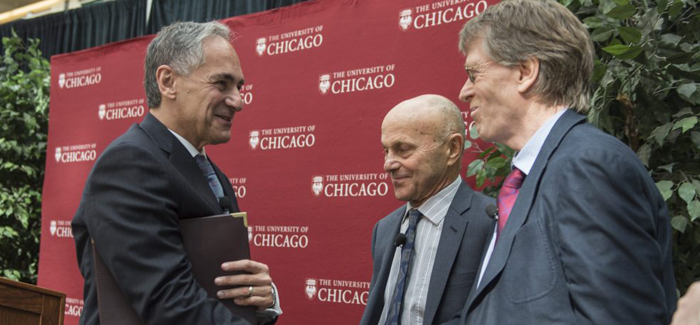
President Robert J. Zimmer discusses initiatives that renew the University’s commitment to being an intellectual destination for scholars across disciplines.
With another academic year under way, I want to welcome new alumni and parents to the worldwide UChicago community as well as express appreciation to all of the alumni, parents, and friends who stay engaged with the University. We are all drawn to the University of Chicago as an intellectual destination because of a distinctive culture and environment where accomplished and promising scholars, ambitious students, and dedicated staff choose to pursue their highest aspirations. Our two newest Nobel laureates cited that quality last month as we celebrated the awarding of the 2013 Nobel Memorial Prize in Economic Sciences to Eugene F. Fama, MBA’63, PhD’64, the Robert R. McCormick distinguished service professor of finance at the University of Chicago Booth School of Business, and Lars Peter Hansen, the David Rockefeller distinguished service professor in economics, statistics, and the College, and the research director of the Becker Friedman Institute for Research in Economics. We congratulate them on this recognition of the importance of their work, which has helped shape the modern study of economics and finance.
Our devotion to rigorous inquiry and an intense and open exchange of ideas, and our comfort with complexity and multiple perspectives, also make us an intellectual destination for those beyond the community on campus. Interesting thinkers, many alumni, and those with particular experiences and perspectives, whether they come as faculty, students, staff, visiting scholars, research fellows, or to speak on campus or participate in one of our workshops, add to the energy and constant flow of ideas and argument that are characteristic of the University.
This concept of intellectual destination is reflected in many of our recent endeavors. The Neubauer Collegium for Culture and Society, which held its grand opening on October 3, has launched a program of research, discourse, and events that extends the boundaries of humanistic inquiry. Likewise, the Becker Friedman Institute for Research in Economics has conducted an array of workshops and conferences that draw scholars from around the world who are interested in the intersections of economics, law, business, and society. The Institute for Molecular Engineering has recruited its initial cadre of outstanding faculty members and will soon announce additional major hires, faculty attracted to Chicago by the possibilities of a new discipline-defining integrative approach to design from the molecular scale. The Institute of Politics has brought speakers and experienced public officials to engage with our students.
We are an intellectual destination not only in Hyde Park but increasingly around the world. Our Center in Beijing has fostered novel projects and inquiry in areas across the University and has attracted thousands of scholars, students, and collaborators from China and beyond. Chicago Booth is extending its Asian presence with an executive MBA program in Hong Kong. We recently announced a broad-based Center in Delhi that will support a growing body of faculty and student work, as well as engaging with our alumni and building new collaborations in India. And the University’s recently announced affiliation with the Marine Biological Laboratory in Woods Hole, Massachusetts, itself a major intellectual destination, will increase our ability to pursue promising areas of inquiry and new modes of education in the biological sciences.
One of the University’s fundamental missions, in addition to education and research, is to ensure that our scholarship, when appropriate, can be brought to bear on the complex challenges facing society. One very particular example is in the field of clean water technology, where the Institute for Molecular Engineering is joining scientists and engineers at Ben-Gurion University of the Negev in Israel to develop new technologies for purifying water and enhancing the world’s fresh water supply. Researchers from the University and Argonne National Laboratory also are working with a diverse set of partners to develop new energy storage technologies, supported by a five-year $120 million grant from the US Department of Energy. The Pritzker School of Medicine continues to be a leader in understanding how large-scale computation can directly lead to better outcomes in clinical care. The Urban Education Institute is having an impact not only on the lives of children in our charter school but through the dissemination of its findings on improving schooling more broadly.
Through our collective work and commitment to our distinctive intellectual and educational environment, we renew the University every day. However, creating and renewing this environment also requires continuous attention to infrastructure. Around the campus you can see visible signs of our investment in the facilities that support faculty and student work, including laboratories, libraries, classrooms, residence halls, and hospitals. We have made it a priority to raise funds for student and faculty support, including scholarships, internships, and professorships. We also continue to make significant investments in the Laboratory Schools (Earl Shapiro Hall, housing the school for the youngest students, opened earlier this autumn) and in the retail and cultural environment in and around Hyde Park, which enriches our community as well as helps us to recruit and retain outstanding faculty, staff, and students.
None of this would be possible without the vision and generosity of the University’s trustees, alumni, and friends, whose philanthropy has made a key contribution to the University’s momentum. More than 45,000 donors gave a total of $459 million in new gifts and pledges in the past year, a 48 percent increase over the previous year. That is a remarkable statement of confidence in the University and a commitment to its ongoing eminence.
Thank you for your continuing connection with the University. I am grateful for your accomplishments, which reflect on our entire community, and for the contributions each of you makes to the University’s success. I wish all of you an exciting, productive, and gratifying year ahead.
This column was adapted from President Zimmer’s September 30 welcome message to faculty, staff, and students.
